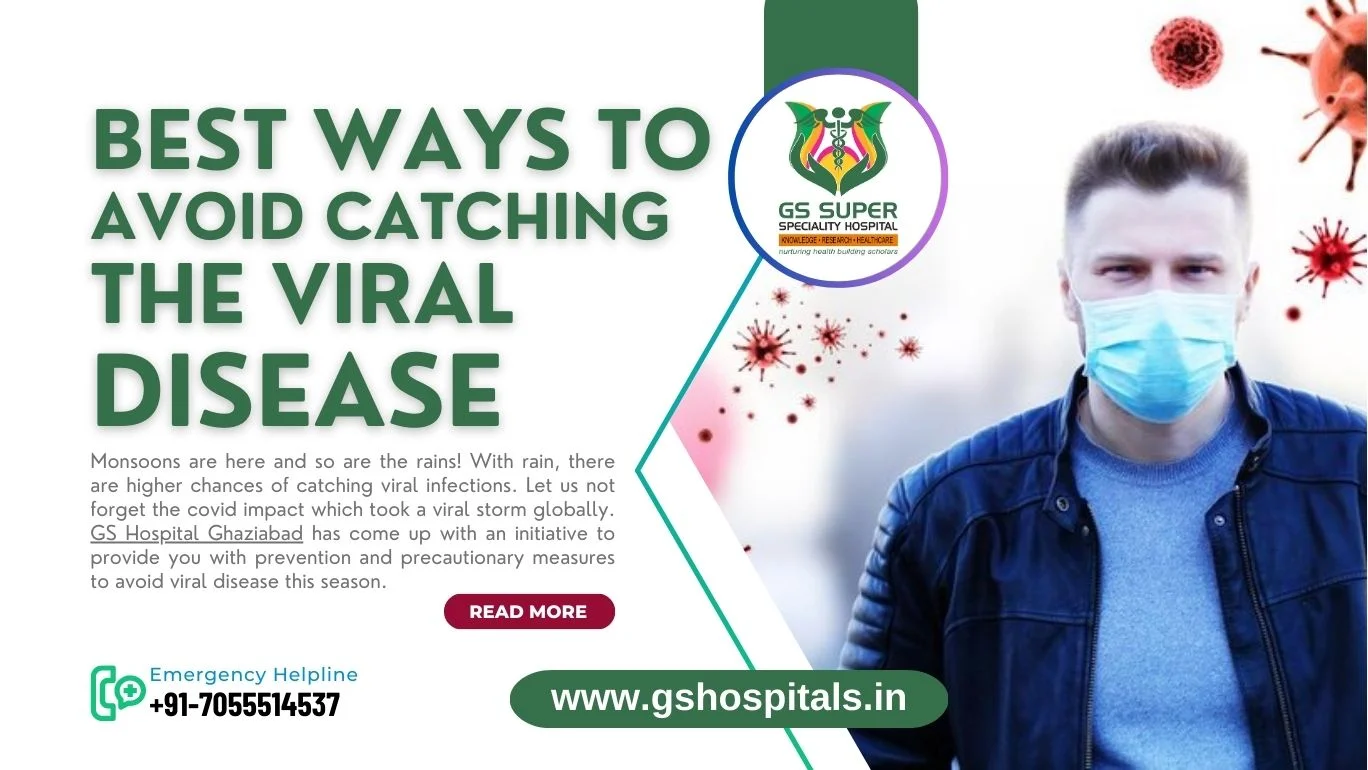Monsoons are here and so are the rains! With rain, there are higher chances of catching viral infections. Let us not forget the covid impact which took a viral storm globally. GS Hospital Ghaziabad has come up with an initiative to provide you with prevention and precautionary measures to avoid viral disease this season. Also, World Hepatitis Day is on 28th July 2023. GS Hospital Ghaziabad, the best hospital in India, takes a step forward to bring about awareness globally about the viral disease. This hospital is dedicated to raising awareness about viral disease as a World Hepatitis Day initiative.

Before we take a deep dive into the topic of the best ways to avoid catching viral diseases, let us give you a sneak peek into viral diseases.
As the name suggests, “viral” means “to spread”. Yes, that’s right. Viral diseases are communicable diseases that tend to spread due to their contagious activity. Viral diseases are infections caused by viruses. They are also known as “superbugs.” They tend to spread different types of infection ranging from minor ones like flu or cold to severe ones like HIV.
The viral disease may affect one or multiple systems of the body from the respiratory system to the brain depending on the severity of the infection and the type of viral attack.
The different types of viral diseases are as follows:
The viral disease may enter the human body through the following pathways:
Generally, our body is protected from the viruses causing infection with the immune system or defensive mechanism which protects the body by providing a shield. If the immune system is weakened, the body fails to fight viruses. This causes viruses to multiply resulting in infection and attacking other healthy cells.
The general symptoms of viral diseases are as follows:
It is important to stop the spread of the virus which may affect multiple systems. In such cases, along with proper medication from your doctor, there is a need to take certain precautionary measures to avoid viral diseases.
It is important to stop the spread of the virus which may affect multiple systems. In such cases, along with proper medication from your doctor, there is a need to take certain precautionary measures to avoid viral diseases.
Handwashing is a must to protect yourself from any germs. Wash your hands regularly and frequently in case of flu-like symptoms after coughing, sneezing, visiting washrooms, vomiting, or even simply eating. Follow the handwashing guidelines:
Keep your hands away from your face, nose, mouth, and eyes to avoid the spread of infections. Touching your face frequently can result in a faster spread of infections by entering your body.
Are you going through an active infection? It is important to avoid close contact and stay away from people at around 6 feet. Avoid visiting public and crowded places. It is important to avoid going to school or work and take an off day instead even though you are completing your course of medications.
Coughing and sneezing can cause faster spread of infections. They can spread through respiratory droplets in the air. It is important to cover your mouth and nose with your hand or with disposable tissue which is the best option. Post coughing and sneezing always make it a point to wash hands.
If you are sick, you need to take care and stay home for faster recovery. Not only that, avoiding meeting people during sickness can help prevent the spread of viral diseases. Do not shake hands or touch others when you are sick.
Clean and disinfect objects and surfaces which you use frequently. It is important to disinfect your mobile, tablet, computer, laptop, switchboard, desk, and room as well to prevent cross-contamination which will trigger the spread of viral disease. You can use an alcohol-based disinfectant along with sanitizer to help prevent the spread of infection.
Boosting immunity is a must with supplements, a healthy diet, and optimum hydration. It is important to ask your doctor about flu shots, especially for recurrent viral diseases. Babies must be vaccinated to prevent any kind of viral infections which helps in boosting immunity. Remember to take your immunity dose of supplements and follow up with a healthy lifestyle to keep infections at bay.
The viral disease may crop up with viral infection with the first sign of viral fever. Some viral fever may resolve on its own. However, it is recommended that if you have a fever for more than 24-48 hours which does not resolve with paracetamol, it is recommended to reach out to the best hospital for your treatment for medical care. Routine check-ups with your doctor and lab tests are a must for avoiding any recurrence of viral diseases to prevent severe infections in the future.
Wondering which hospital is the best for viral diseases? Well, when it comes to healthcare, we all want to choose the best doctor in India. Let’s explore in the next part of the article the best hospital with a team of the best doctors in India for viral issues.
GS Hospital is considered as ranked #1 amongst the top 10 hospital in Ghaziabad. It is a well-known and medically reputed best hospital in Uttar Pradesh. Thanks to its special expertise with highly-qualified and board–certified doctors, GS Hospital is one of the pioneers in treating viral diseases to prevent a recurrence.
GS Hospital is a highly renowned hospital with a professional team of the best doctors in India along with dedicated staff. They work in the following steps to protect you from viral diseases.
It is important to monitor your symptoms in cases of flu-like problems in the initial stage itself. Here are certain warning signals on when you should see a doctor for a viral disease which is as follows: